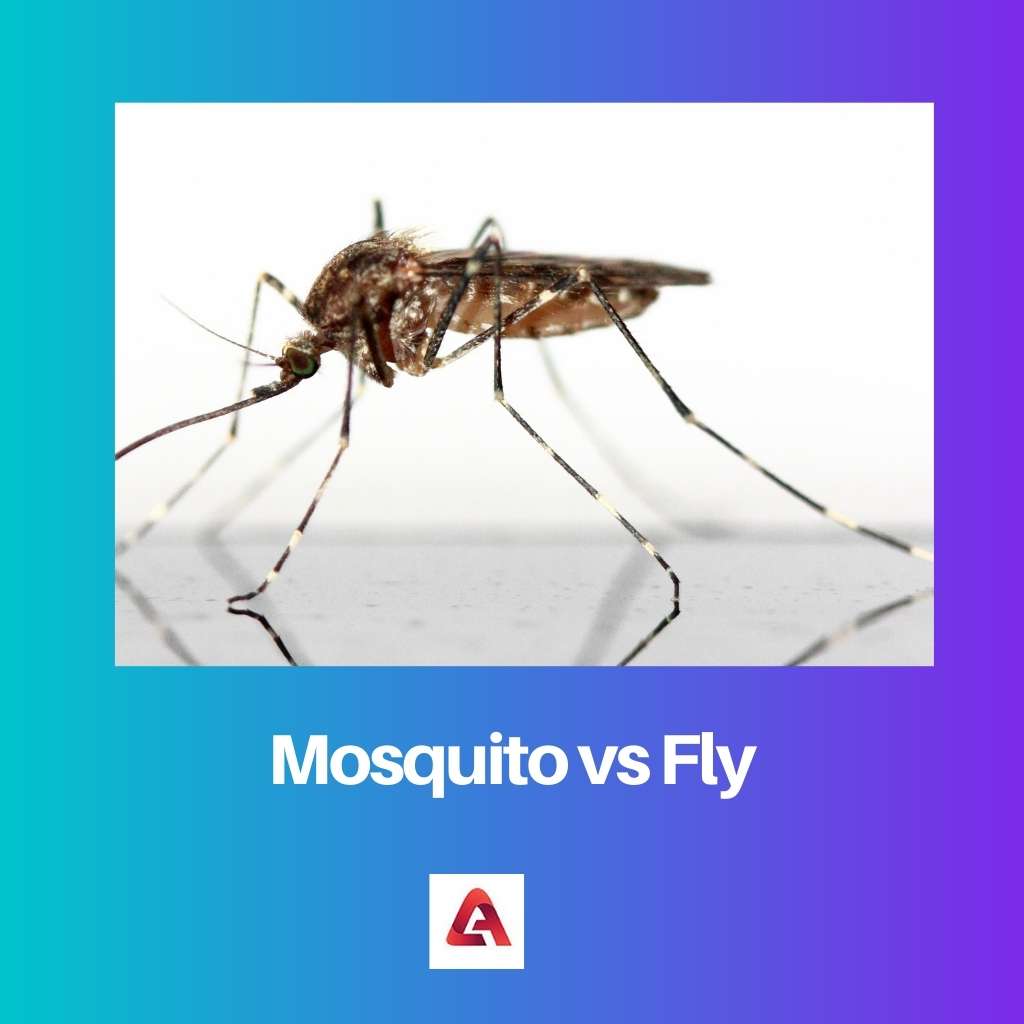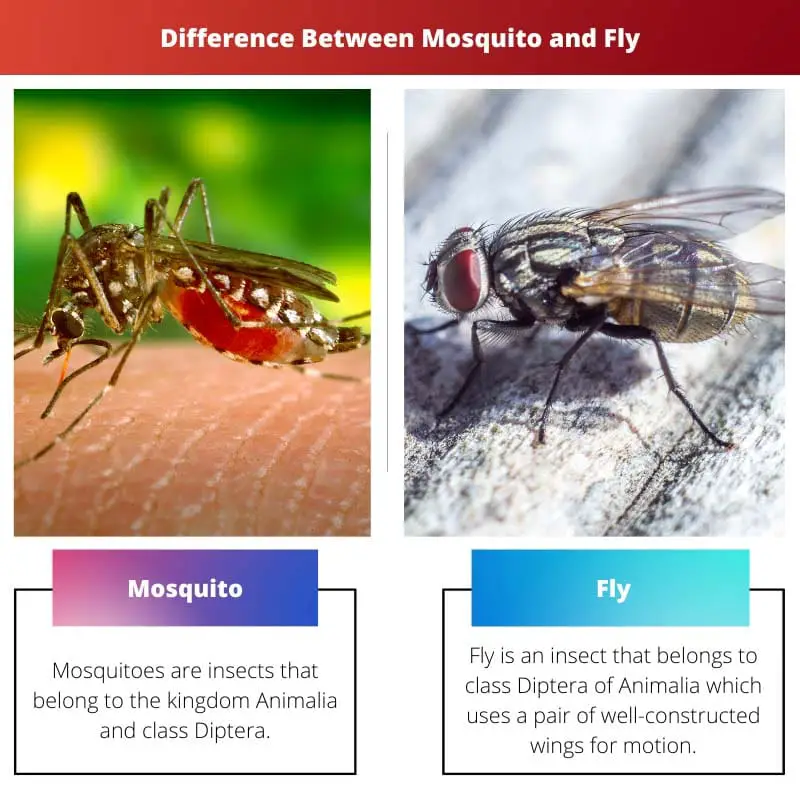Mosquitoes and flies are in general seen as pests that spread many different kinds of diseases by acting as a vector carrier to a pathogen. They are seen as a constant trouble maker in homes and other places such as office space or open fields.
They bite and fly around both humans and animals creating restlessness and uneasiness along with itchiness.
Key Takeaways
- Mosquitoes are insects that feed on blood to reproduce, while flies do not feed on blood but on various organic materials.
- Mosquitoes can transmit diseases like malaria and dengue, whereas flies spread diseases through contamination of food and surfaces.
- Mosquitoes have slender bodies and long, thin legs, while flies have more robust and shorter legs.
Mosquito vs Fly
Mosquitoes are flying insects that feed on blood. Flies are insects that feed on a variety of materials, including decaying organic matter and animal waste. Mosquitoes and flies are considered a health risk because mosquitoes can transmit diseases, and flies can spread bacteria.

Mosquitoes are famous for all the diseases they spread by being a vector or a carrier to viruses and many other pathogens. The food consumed by them differs from the gender of the mosquito.
Female mosquitoes need nutrient-filled food to lay the eggs and nourish the young ones whereas male mosquitoes can survive on a low nutrient diet too.
Flies might seem harmless as they don’t bite and create itchiness in humans and other species of animals. But they sure are dangerous and can be carriers of a wide range of diseases.
They consume many different food matters and it is rare to see them drinking up blood from an animal. Males and females consume similar kinds of food and there are no discrepancies.
Comparison Table
| Parameters of Comparison | Mosquito | Fly |
|---|---|---|
| Family | Culicidae | Muscidae |
| Mouth Type | Sucking | Spongy |
| Presence of Pathogen in Gut or Salivary Gland | Yes | No |
| Spreads Pathogen by Touch | No | Yes |
| Diseases Spread | Malaria, dengue, chikungunya, etc. | Typhoid, cholera, etc. |
What is Mosquito?
Mosquitoes are insects that belong to the kingdom Animalia and class Diptera.
Commonly seen as pests, mosquitoes do the bare minimum in the ecosystem that can be seen as useful to the biosphere.
They play a major role in transmitting many vector-borne diseases some of which are fatal and can result in the death of the infected person if not treated on time.
Most of these pathogens are transferred onto humans and other animals when a mosquito bites them to suck the blood out.
The pathogens might be present in the gut or the salivary glands of the mosquitoes. This makes it easier for the pathogen to be transmitted when the mosquito bites humans.
Mosquitoes have a sucking type of mouth called a proboscis. It is through the proboscis that the blood is taken into the mosquito and the pathogens are released into the bloodstream of the humans.
Male and female mosquitoes have different nutrient requirements as females need to lay eggs and ensure proper care for them, unlike male mosquitoes.
For this reason, it is the female mosquitoes that bite and suck the blood from living beings to draw the nutritional content from the blood for reproduction.
Ale mosquitoes on the other hand can be seen sucking on plant sap and fruits.
Males are larger than females.
Mosquitoes lay their eggs vertically on water that is stagnant and not in motion.
The eggs undergo many stages of life such as pupa, egg, and eventually grow the pair of wings transforming into a full adult male or female mosquito.
They spread many diseases such as chikungunya, dengue fever, Zika virus, and most commonly malaria.
The spread of these diseases can only be controlled by stopping mosquito growth and propagation in the area by eliminating stagnant water presence.

What is Fly?
Fly is an insect that belongs to class Diptera of Animalia which uses a pair of well-constructed wings for motion.
Flies are pests that are seen during the winter season throughout different parts of the globe.
It would be difficult to find a place that has no presence of at least one species of flies.
Flies in general go by the scientific name of Musca domestica and show the distinction in gender with physiological differences such as the size of the fly and the color of the underbelly.
Flies are vectors for many pathogens which might be present around the garbage cans and excreta of animals or even dead and decaying matter.
They act as carriers for such pathogens when they sit on such matters to take in food and gain nutrition.
After the pathogen has been lodged onto the exterior body of the fly, they might go next to sit on the food prepared and laid out on the table at different houses.
This would transfer the pathogen onto the food that humans would consume thereby ensuring that the pathogens are ingested by humans who would eventually get infected.
But flies not only act as carriers for pathogens that infect humans, but also many other animals and birds.
Some of these diseases are dysentery, cholera through water bodies and contamination, typhoid, conjunctivitis, etc.
Some diseases spread by flies can be fatal if not treated on time and if the correct medication isn’t consumed.
Flies are known to lay eggs in waste matters such as excreta exposed and out in the open, dead and decaying organisms which have been exposed to oxygen and start reacting with the environment to release toxic content, etc.
Once matured, the eggs break out of the cocoon-like formation to be a male or female fly.
These flies need nourishment which is taken from almost everything from plants to animals.
Flies have a sponge-like mouth that soaks up their food.
Before soaking the food, flies secrete a small amount of digestive juice onto the skin of their food which would ensure that a bit of the food gets digested.
This digested food is what flies soak up with their spongy mouth and thereby ensure proper nourishment.

Main Differences Between Mosquito and Fly
- Mosquitoes belong to the family Culicidae whereas flies are under the family Muscidae.
- The mouth of mosquitoes are of sucking type which ensured that they can pierce into the body of their food and take up either the blood or the sap of the plant whereas flies have a sponge-like mouth that allows them to soak up their liquid food.
- Pathogens don’t enter the body of flies whereas they are present within the gut or the salivary gland of mosquitoes.
- Mosquitoes lay their eggs in stagnant water whereas flies are known to lay their eggs in the waste matter such as excreta and decaying things.
- Mosquitoes are present during the summer and rainy season whereas the presence of flies could be noted well during the winter season.

- https://www.cabdirect.org/cabdirect/abstract/19810587290
- https://academic.oup.com/jee/article-abstract/93/4/1269/2217277
